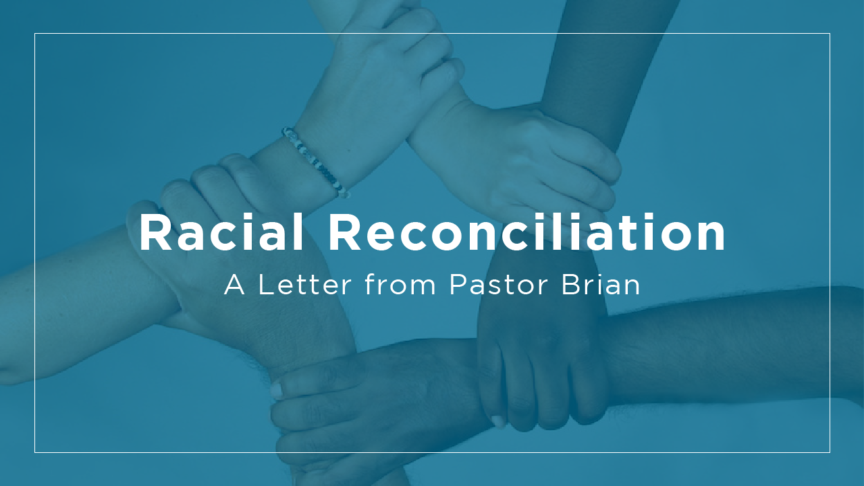June 3, 2020
Dear Trinity Family,
My heart is heavy.
My heart is heavy for the collective grief and anger that so many of us are feeling for the horrible death of George Floyd, the disturbing images burned into our minds of a white police officer kneeling down on Floyd’s neck while three other officers stand by and watch, and Floyd gasping the words, “I can’t breathe.”
My heart is heavy for the deep wounds of prejudice and racism that have been surfaced through all of this. While most of the protests have been peaceful (and the majority of protestors are exercising an important freedom to speak out peacefully about what needs to change), my heart is heavy for those protests that have turned violent.
My heart is heavy for the many emails, social media exchanges and conversations that the staff and I have had over the last several days with people in our own church and community who are black or brown or in close relationships with someone who is black or brown (kids, spouses, relatives, friends, neighbors, co-workers), and what they are experiencing right now as a part of the minority culture. Understandably so, our brothers and sisters feel scared, angry, confused, and tired.
My heart is heavy for people I’ve talked to in our own church and community who serve on law enforcement or have friends and relatives serving in law enforcement (here and in other parts of the country), and for their families who feel scared every time their spouse or parent leaves the house to go be “on duty.”
My heart is heavy for how deep the divisions are in our nation right now. For how politicized everything has become, and how hard it is for us to talk about really important things like racism, white privilege, and systemic structures of injustice. My heart is heavy for the “us/them” mentality that is so pervasive, for the ways in which we all keep feeling pressured to choose sides, like “Do you stand with the protestors or with law enforcement?”
Friends, this “us/them” thinking, these “either/or” choices, are problematic and false. The gospel of Jesus Christ calls us to something more, something better, something truer and more beautiful. The Apostle Paul puts it this way in Ephesians 2:14-15:
“For he [Jesus] is our peace; in his flesh he has made both groups into one and has broken down the dividing wall, that is, the hostility between us. He has abolished the law with its commandments and ordinances, that he might create in himself one new humanity in place of the two, thus making peace, and might reconcile both groups to God in one body through the cross, thus putting to death that hostility through it.”
Perhaps like you, I’ve been reflecting and praying a lot over the past couple weeks about how to best respond to what’s unfolded. How do I respond as a disciple of Jesus? How do I respond as a pastor in the community? How should we respond as a church?
One of my deepest convictions is that the gospel of Jesus Christ calls us to be bridge-builders—to be a part of God’s work of seeking justice, peace and reconciliation. This is what it means to be the body of Christ in and for a broken and fractured world.
Where do we begin?
I believe it must begin with listening. Listening to a brother or sister who offers a different perspective because of their experience. And I believe we must begin with lament—standing with those who suffer and finding the courage to honestly acknowledge and confess before God and each other the deep racial divides that have been part of our country for a long time.
And I believe it must begin with looking into our own hearts and attitudes and asking God (and others), “Where are my own blind spots? Where is bias and prejudice showing up in me, and I’m not aware?” It takes courage to ask these questions, but I believe it is a critical step for growing as disciples of Jesus and joining him in the ministry of reconciliation.
This Sunday, we’re going to spend some time in worship lamenting together the reality of racial injustice and the walls that divide us. Worship at the Orange City campus will be online only. I will also be preaching on our call, as Christ’s body, to strive for peace and reconciliation (Ephesians 2:11-22). I believe this worship service will be really important, and I also realize it may be challenging and uncomfortable for some of us. I hope you will plan to engage and be open to what the Holy Spirit wants to do in your life and our life together.
I’m also planning to lead a discussion over the summer on the book Be the Bridge: Pursuing God’s Heart for Racial Reconciliation by Latasha Morrison. If you would like to be a part of this book discussion, please email me at keepers.brian@gmail.com.
My heart is heavy.
But it is not without hope.
We grieve for all that is happening, but we do not grieve as those who are without hope. Our hope is in the living God—Father, Son and Holy Spirit—who is at work even now breathing peace, justice and new life into all that is broken, beaten-down and in need of redemption.
Even so, come Lord Jesus.
Will you join me in being a part of this kingdom work?
Grace and Peace,
Pastor Brian

